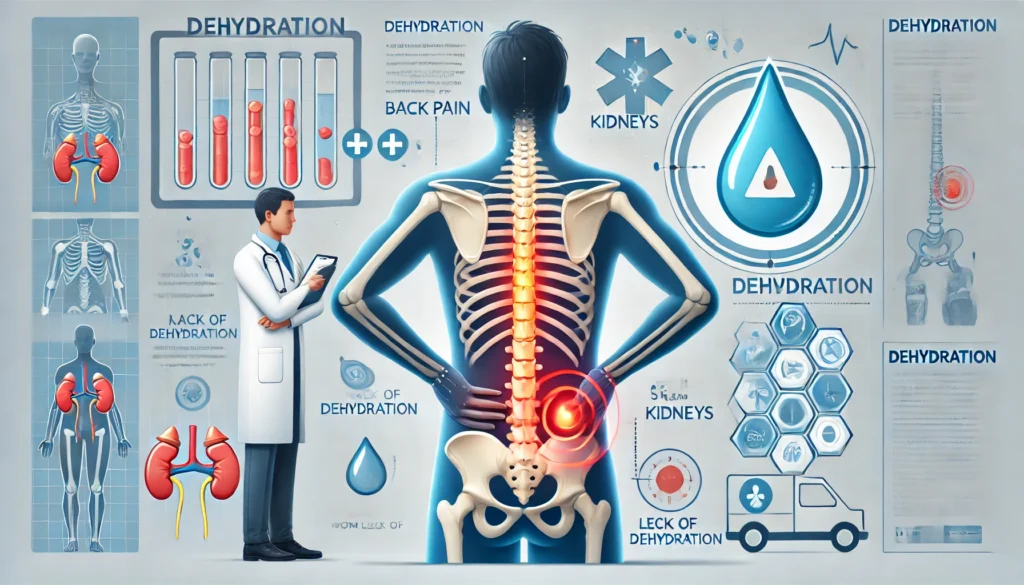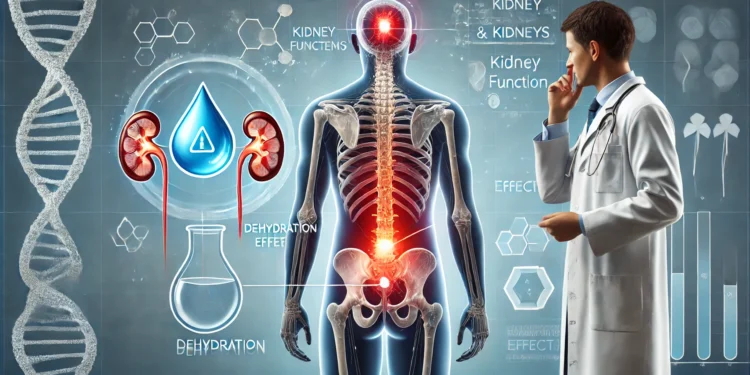Dehydration is a common health issue that many people experience, especially during hot weather or after intense physical activity. While dehydration is typically associated with symptoms like thirst, dry mouth, and fatigue, it can also contribute to other unexpected symptoms, including back pain. But can dehydration cause back pain? The answer is yes.
In this article, we’ll explore how dehydration can lead to back pain, why it happens, and what you can do to stay hydrated and prevent discomfort.
How Dehydration Can Lead to Back Pain
The body relies on water for nearly every function, including the maintenance of muscle and joint health. When you become dehydrated, various physiological processes are affected, leading to symptoms that can contribute to or directly cause back pain. Here’s how:
Read Also: How Long Does a Toradol Shot Last For Back Pain – Does a Toradol Injection Alleviate Backache!
Muscle Cramps and Tension
When you are dehydrated, your muscles can become more prone to cramping and stiffness. Water is essential for proper muscle function, and without enough hydration, the muscles in your back can contract and become tight, leading to pain and discomfort. Dehydration also affects the balance of electrolytes, which are crucial for muscle function. An imbalance in these electrolytes can result in muscle spasms that contribute to back pain.
Spinal Discs and Fluid Loss
Your spinal discs, which act as shock absorbers between the vertebrae, are made up of a gel-like substance that requires water to maintain proper function. When you’re dehydrated, these discs lose fluid, making them less effective at cushioning the spine. This can result in increased pressure on the vertebrae, leading to back pain, stiffness, and even herniated discs over time.
Joint Pain and Inflammation
Dehydration can also lead to a reduction in the lubrication of the joints, including those in your back. When your joints lack adequate fluid, they can become stiff and inflamed, causing pain and discomfort. This can be particularly problematic for individuals who suffer from conditions like osteoarthritis, as dehydration may exacerbate joint issues.
Increased Sensitivity to Pain
Dehydration can cause the body to become more sensitive to pain. Without proper hydration, the body’s pain receptors can become more reactive, making even mild discomfort feel more intense. This increased sensitivity can amplify back pain, even if it’s caused by minor strain or injury.
Symptoms of Dehydration That Could Contribute to Back Pain

While back pain might not be the first symptom people associate with dehydration, it often accompanies other signs that indicate the body isn’t getting enough water. These symptoms include:
- Dry mouth and throat
- Fatigue and weakness
- Dizziness or lightheadedness
- Headaches
- Dark-colored urine or reduced urine output
If you’re experiencing these symptoms along with back pain, dehydration may be a contributing factor.
How to Prevent Dehydration and Back Pain
Fortunately, staying hydrated and taking preventive measures can help reduce the risk of dehydration-related back pain. Here are a few tips to ensure you stay hydrated and keep your muscles and joints in optimal condition:
Drink Plenty of Water
The simplest and most effective way to prevent dehydration is to drink plenty of water throughout the day. Aim for at least eight 8-ounce glasses (about 2 liters) of water daily, but this amount can vary depending on your activity level, climate, and individual needs.
Balance Electrolytes
Electrolytes, like sodium, potassium, and magnesium, play a critical role in muscle and nerve function. When you sweat excessively or are dehydrated, your electrolyte levels can become imbalanced, leading to cramps and back pain. Consider drinking sports drinks with electrolytes or consuming foods like bananas, spinach, and avocados to help maintain electrolyte balance.
Stay Hydrated During Physical Activity
If you’re engaging in exercise, especially in hot or humid conditions, make sure to hydrate before, during, and after physical activity. Sweating can quickly lead to fluid loss, so replenishing water and electrolytes is essential to prevent dehydration and muscle cramps.
Monitor Your Fluid Intake
In addition to water, other fluids like herbal teas or water-rich fruits and vegetables (such as cucumbers, watermelon, and oranges) can help you stay hydrated. It’s important to drink fluids consistently throughout the day, not just when you feel thirsty.
Pay Attention to Your Body
If you start to notice symptoms like dry mouth, fatigue, or dizziness, take it as a sign that your body needs more fluids. Addressing dehydration early can prevent more serious issues, including back pain and muscle cramps.
When to See a Doctor for Dehydration-Related Back Pain
While mild dehydration-related back pain can usually be managed with hydration and rest, there are times when you should seek medical attention. If your back pain persists, becomes severe, or is accompanied by other concerning symptoms like difficulty urinating, confusion, or dizziness, it may indicate more serious dehydration or another underlying condition. A healthcare provider can assess your symptoms and recommend appropriate treatment.
FAQs:
1. Can dehydration directly cause back pain?
Yes, dehydration can lead to muscle cramps, stiffness in joints, and reduced cushioning in spinal discs, which can result in back pain.
2. What are the signs of dehydration that could lead to back pain?
Common signs of dehydration include dry mouth, fatigue, dizziness, and dark-colored urine, which may accompany back pain.
3. How can I prevent dehydration-related back pain?
Drink plenty of water, balance electrolytes, stay hydrated during physical activity, and consume hydrating foods like fruits and vegetables.
4. How much water should I drink to avoid dehydration?
Aim for at least eight 8-ounce glasses (about 2 liters) of water a day, though individual needs may vary based on activity level and environment.
5. When should I see a doctor for dehydration-related back pain?
If back pain persists or worsens despite hydration or is accompanied by severe symptoms like dizziness or confusion, you should seek medical attention.
Conclusion:
Dehydration can indeed contribute to back pain by causing muscle cramps, reducing the fluid in spinal discs, increasing joint stiffness, and making the body more sensitive to pain. By staying hydrated, balancing electrolytes, and listening to your body, you can reduce the risk of dehydration-related back pain and maintain overall health. If you experience persistent or severe symptoms, consult a healthcare provider to ensure that your back pain isn’t linked to more serious health concerns.Maintaining hydration is key to keeping your body functioning properly, so make sure you’re drinking enough water and taking care of your health every day.











